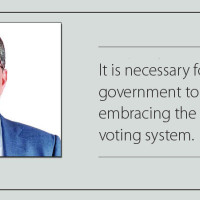- Wednesday, 11 February 2026
Stop Political Meddling In Varsities
Policy Research Institute (PRI) - the public policy expert organisation - has come up with a comprehensive study report dealing with various aspects of establishment, operation and management of universities in Nepal. The report has set forth several recommendations detailing out minimum standards which need to be satisfied for the commencement of new universities in the country. The PRI-initiated study has come up with a time when the provincial governments have brought forth a myriad of their plans to set up universities in their respective jurisdictions without any careful planning and assessment. At this backdrop, the government is also reported to be going for enacting an umbrella law to administer and govern universities.
Needless to say, the Nepali universities are ruled and governed by separate statute - each articulating their own set of official curricula and system of evaluation. This consideration on the part of the government can be welcomed since a uniform and comprehensive university legislation will set standard terms and conditions for operation and management of the universities in the country. Almost a dozen universities are opened and exist in Nepal but almost all universities have been plagued by one or the other malaises. Experts have identified and bandied about that the political meddling and interference has been the fundamental reason responsible for the sharp deterioration and mess in the quality and standard of higher education.
Avenue for political diktat
However, as commented in the media, the proposed university law if enacted will provide more room and avenue for political diktat and control since it is going reportedly to vest more power and authority in the chancellor of the university. If this is true, the new legislation will not help much in correcting the malaises. Normally, in our context prime minister by virtue of his official capacity as the executive chief of the government automatically becomes the chancellor of the public or government aided universities as a continuation of the previous practices and traditions that was established when the first and foremost Tribhuvan University was set up during early sixties. The then King used to be the chancellor of the university.
At a time when strong voices have been raised against the provision for making prime minister as the chancellor of the university with a view to minimise and scale down the involvement of political authority in manipulating and peddling influence in the operation and management of university in the country, the proposed law instead seeks reportedly to buttress it. If the law is enacted chancellor can sack the vice chancellor and other authorities of the university in case the executive head of the government finds some reason to be displeased and dissatisfied with apex level university officials. Many fear this provision will further embolden and empower prime minister to use his or political discretion and interest to decide the fate of the university authorities.
Apart from this there has been a public outcry and resentment expressed on the haphazard and politically motivated manner with which universities are reportedly awarding affiliations to different private colleges and institutes without any regard to minimum academic purpose, norms, requirements and standards. The TU and Kathmandu universities indeed seem bent on granting affiliations to sundry private colleges and institutes to introduce and run classes on different subjects and disciplines. The Lumbini University, established with a view to promote and support studies on Buddhist philosophy and religion, has awarded affiliation to engineering colleges. Likewise, Nepal Sanskrit University is set reportedly to award affiliation to agricultural campus but neither does it have the human resource to formulate curriculum on agriculture studies nor is it the subject of relevance for it.
The Far Western University, according to the news report, has granted affiliations to several campuses en bloc to conduct classes on technical and non-technical subjects despite the fact that it has neither human resources, approved and updated curricula nor the administrative and managerial capacity to monitor the campuses. Likewise, the agricultural and forest university (AFU) at Rampur, Chitwan has also decided to award affiliation to private agricultural campuses sharply compromising on the standards and norms set for the agricultural campuses in the past. In the same way, Tribhuvan University has allowed the private campuses to introduce programmes in different courses and disciplines with a view to attract and swell students.
Ill-gotten benefits
The above information related with the university activities and priorities tends to reveal that the institutions established for higher education are occupied with doing business through affiliation deals instead of keeping concentration in improving quality of higher education. It is alleged that the university authorities prefer to deal with the private colleges and institutes since this can give them allegedly undue and ill-gotten benefits and advantages. Needless to say, public universities and colleges are indiscriminately politicised where the academic and administrative authorities are appointed on the basis of their access to and influence in the power echelon. What generally matters is their loyalty and support to the party leadership, not the academic credential and record.
Many public intellectuals and educationists who have intimate knowledge on the university education articulate on the need to separate academics and politics and protect the sanctity and integrity of the academic institutions. It has been reported time and again that the academic integrity and capacity of the universities has witnessed a downward spiral especially during the multiparty democracy era as trade unionism made inroads into the realm of both teachers and students. Unless academic institutions are not allowed to work sans political meddling and interference, neither will the present day anarchy seen in granting affiliation will be contained nor the decline in the academic standards will be checked.
(The author is presently associated with Policy Research Institute (PRI) as a senior research fellow.)
















